
|
The Jedi were real? This article is part of the history of Clan Odan-Urr and isn't part of current events.
Please do not remove this tag or the contents. These articles exist for historic purposes.
|
The Dac Compound is the primary city of the Mon Calamari City-State on New Tython, and a member of the Independent Colonies of New Tython. A floating city with strong walls and varied, exotic buildings, it was first established by refugees and colonists from the planet Mon Cala in 11 ABY. Built around an island in the Bythic Ocean, it was initially just a collection of ramshackle homes constructed from decommissioned starships, but expanded over time to become a semi-submerged city with aquatic and floating components. Positioned in a key location for aerial and nautical travel between continents, it has long been a central hub for trade, supply, and military operations and has used this leverage to become an economic and political power on the planet.
History
Following the arrival of the Jedi of Odan-Urr in 3 ABY, colonists and explorers who reached New Tython had a point to rally around; and yet, while the settlers that would come to be called Tythonians spread out across the land and found conflict with the planet's Harakoan natives, several Mon Calamari settlers fleeing the grasp of the Empire in 11 ABY would instead settle on a sparsely-populated island in the Bythic Ocean; while the tiny indigenous Harakoan population originally objected to their presence, they were driven off of the island via a combination of superior numbers, advanced technology, and a trade pact that saw them eventually opt to relocate. Having a mind to settle and explore the wealth of the world's oceans, the settlers decommissioned their transports and attached several of them, thus creating a makeshift settlement upon the island.
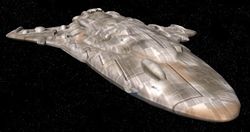 Ships of Mon Calamari design were cannibalized to create the original Compound.
Ships of Mon Calamari design were cannibalized to create the original Compound.
In the years that followed, the settlement made contact with its homeworld of Mon Cala, where they attracted more settlers and migrants to their island home; this led to the tiny landmass itself being quickly covered by the expanding colony, and would see the construction of barges, platforms, and attached modules to expand the Compound across several square kilometers of ocean surface. Christened the Dac Compound, after another name for their homeworld, the settlers rallied behind the heads of the most influential families and established the first Elder Council, as well as formalizing the volunteer defenders of the Compound into the Marine Corps.
In the years that would follow, the Dac Compound maintained limited naval and aerial trade with other colonies, while developing its own industrial pursuits above and below the water's surface; when the Dark Jedi Brotherhood invaded in 33 ABY, they were well-established and possessed fortified walls, yet had no interest in becoming embroiled in a conflict centered on the planet's Jedi alone and thus withdrew beneath the waters of their home. They would largely avoid the political terrorism of the Mad Hermit Cy Thuron and his New Dawn, and would use their position of advantage and their isolation at sea to shield them from the advances of colonists and Harakoans alike in the unrest that followed, maintaining a stance as a neutral body. Over time, settlers began to expand, settling new villages in key areas that were either uninhabited, or turned over from tribal control due to diplomatic or military action.
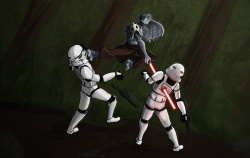 Kah Manet would liberate the Elder Council and Marine Corps during the Compound's liberation, allowing them to retake their home.
Kah Manet would liberate the Elder Council and Marine Corps during the Compound's liberation, allowing them to retake their home.
It was during the Fall of New Tython that the Dac Compound was forced to relinquish its neutral, non-interventionist stance and become a position of vital importance on the planet. Conquered by the Thuron Monarchy, the Compound was forced to surrender to the Thuronian Royal Forces, an army of mercenaries, pirates, and assassins amassed by Cy Thuron after his departure from the planet in 35 ABY. Defenseless, and unwilling to be sacked, the Elder Council elected to accept imprisonment over death while a few members of the Aristocracy - essential administrators and overseers of Compound life - were either willingly folded into or forced into serving the Monarchy as Governors. The people of the Compound would then be forced to live a muted existence almost entirely above the surface of the Compound, with their customs suppressed in favor of total worship of Cy Thuron as the planet's Sith King. Thuronian soldiers and mercenaries, largely humans due to Thuron's racist and xenophobic decrees, would take up forced residence and would be promised eventual control of the Compound, while potential rebels, dissidents, and Force sensitives found among the natives of the Compound were sent to Purity Rock or outright executed.
Liberated during the Liberation of New Tython by the Harakoan Tribal Army and the Kotahitanga-Unity Defense Force, the Compound was first conquered and swept of entrenched Thuronian forces from without, while the Gungan Jedi Kah Manet and his militigungs from the Scourge of Lianorm - a KUDF militia - liberated the Elder Council and the Marine Corps before working to arm them. The result was a quick victory, with the majority of Thuronian forces either surrendering or fleeing the Compound by air and sea. Following this event, and the death of the former Chairman during the fighting, the Compound's seat was assumed in the interim by Corps General Mughim Viik, who leveraged the Compound's military significance in order to revise the fledgling Treaty of Menat Ombo. Viik would go on to sign the Treaty on behalf of the planet's newly-officiated Independent City-States, and would use his shrewd tactical mind and surprising political skill to become elected as the Compound's first Quarren Chairman.
Today, the Compound polices itself and trades lucratively with other nations of New Tython, while maintaining its Mon Calamari culture, its autocratic government, and its sovereignty in its controlled territories. Though peaceful, its politicians are always seeking new means by which to leverage new assets, resources, and potentially even territory for lawful absorption by the City-State.
Areas and Districts
Aegis District
Structured around the Compound's primary buildings is a large, thick wall, controlled by floodgates at crucial points and used to keep out large terrestrial and aquatic forces in times of war. These are bolstered by anti-air turret weaponry built into the towers themselves, making aerial deployment without first disabling such emplacements impossible. These defenses, largely simple in times past but bolstered by Thuron's men, are maintained in accordance with international law and are capable of holding off an invading nation - while not capable of stopping an interstellar force like the KUDF, whom the Compound would rely upon if Galactic forces attempted to conquer their territory.
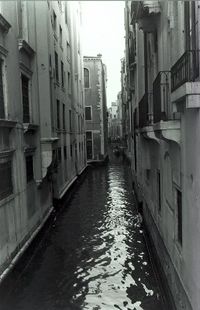 Canals and rivers serve as streets in the Mercantile District, and in many others.
Canals and rivers serve as streets in the Mercantile District, and in many others.
A series of barracks, armories, and other tactical buildings are located in the Aegis District, as are the Marine Corps Academy and the Compound's hangar bays for submersibles and hovercraft. Much like most of the Compound, the vast majority of these buildings are underwater, with much of the Compound connected by underwater lanes, tunnels, and passages that allow for quick travel by civilians - and rapid dispersal throughout the Compound by Marine Corps forces undergoing police or defensive duty. This makes the Aegis District one largely avoided by outsiders, as it holds little for them to see or interact with, while making it an effective bulwark against other nations and Harakoan tribes.
Communal District
The largest District by far, this houses the settlements of the Mon Cala residents of the Compound and consists of both the two-story towers and underwater residences of its people. Its buildings vary wildly, from affordable and packed-together apartments and domiciles to larger, more extravagant villas and penthouses for aristocrats, all built either within the towers or below the waters of the Compound. This area also houses the Compound's main medical center, the Yos Kolina Memorial Hospital, as well as several campuses, universities, and trade schools for the Compound's Working Class. Like most other portions of the Compound, this one is either closed off or largely underwater, and thus is seldom seen by outsiders in its full glory.
Mercantile District
By far the most extravagant District, as well as the one most accessible to outsiders, the Mercantile District is one of the few built almost exclusively above the Compound's waters. Shops, cantinas, and venues service a wide variety of clientele, with luxury restaurants and hotels built into the Compound's towers while more common businesses occupy winding streets punctuated by flowing rivers, canals, and bridged pools. Colorful skiffs and hovercraft taxi visitors, aristocrats, and tourists about, while merchants hawk goods and venues offer their services to poets, musicians, and other entertainers. Lesser establishments exist in alleyways and secondary paths, providing gambling dens, bath houses, and other potentially unscrupulous services to patrons with lesser status and flexible morality. While the Marine Corps patrols the streets and largely keeps them safe, these establishments typically hire their own private security and handle internal issues themselves.
Of note in the Mercantile District are the Compound's landing pads, harbors, and spaceports, servicing spacers, air travelers and nautical merchants at all hours of the day. These center around a cantina of particular infamy, the Kraken's Claw, while allowing the ebb and flow of visitors to the Compound. During the occupation, Thuron's forces reinforced the towers and landing structures of the district, enhancing many towers with anti-air weaponry; these weapons were largely dismantled in accordance with the Treaty, though the fortifications to the spaceports has allowed for more robust trade opportunities. The Mercantile District also houses the Elder's Tower, where governmental procedures take place.
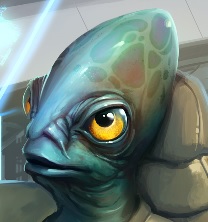 Mon Calamari populate the Dac Compound, alongside a small minority of Quarren settlers.
Mon Calamari populate the Dac Compound, alongside a small minority of Quarren settlers.
Industrial District and Quarren Ghettos
Built below the surface of the Dac Compound and kept from the public eye, the Industrial District is largely automated and is staffed only by maintenance workers and the poorest of the Compound's denizens. An ugly place, often brimming with sea life and encrustations both benign and dangerous, it is a hideout for criminals as well as a place of misery for the Impoverished class. Run by shrewd businessmen and aristocrats, the facilities, factories, and other dwellings of the District are typically either staffed by droids or simple machines, or give work to powerless and under-educated workers who are forced to work for pay and safety standards that approach the lowest allowed even by the Treaty of Menat Ombo.
Amidst these facilities are compounds that have been converted into ultra-low-cost housing, providing underwater shanty-towns and flophouses for citizens without the means to live in proper domiciles. In particular is the area known perjoratively as the Quarren Ghettos, where areas that exclusively house the Quarren populace of the Compound exist. Within these ghettos, poor living conditions and poverty reign, though they have grown to become vibrant centers of Quarren culture in their own way. Most worryingly, the black market of the Compound flows through this area, and feeds on the denizens' well-earned distrust for the Elder Council and the Marine Corps; this is especially true of Quarren like the Chairman, who, although seen as examples for Quarren citizens to rise toward, are espoused by criminals as sell-outs and traitors to their own kind.
Government and Society
As an Independent City-State, the Dac Compound must comply with its Treaty obligations and all international laws; that said, it retains dominion over its agreed-upon borders and maintains its own customs, cultural practices, laws, militia, and government. This government takes the form of the Elder Council, a seated body of eight to twelve members of the Dac Compound's populace; originally formed from the oldest and most influential members of their society, hence the name, new members are elected by the Council in closed sessions following the retirement, dismissal, or death of a seated member. Lead by a Chairman, who holds veto power over laws and decisions and maintains large, but not overpowering, voting power in debates, this Council deliberates and decides upon the laws, economic decisions, and actions of the Compound and its affiliate settlements. The Council also includes the General of the Marine Corps, a post of great significance and one that allows the Corps to properly police the Compound.
 Mughim Viik, current Chairman of the Dac Compound.
Mughim Viik, current Chairman of the Dac Compound.
The Chairman of the Elder Council is elected from seated members of the Council following the death or dismissal of his predecessor; resignation is not unheard-of, but as Council positions and the seat of Chairman do not expire, a seated Chairman will often serve until he is declared unfit or until his death. Voting members will decide over a period of six weeks and will cast their ballots in a blind election, run by the Council but often overseen by a Jedi at the Council's request - a measure to ensure fairness in the cutthroat environment of Compound politics.
Elders of the Council are typically elected from the Aristocracy, the top echelon of Compound society; this is comprised of well-established families of influence and wealth, prominent scholars and business owners, and other well-to-do citizens. The Aristocracy runs the Compound beside the Council, either through economic and educational importance or through positions of administrative control appointed to them by the Council; beneath them, the Working Class works to master trades and professions, as well as seeking education beyond basic knowledge. Meanwhile, the Impoverished - often the families of criminals, failed aristocrats, and the Quarren minority of the Compound - struggle to get by working service and maintenance jobs. Military service in the Marine Corps is one way for the Impoverished to attempt to climb closer to the Working Class and, rarely, the Aristocracy; likewise, Working Class residents will attempt to master important trades or earn vital scholarly degrees, though either path also requires shrewd political maneuvering if one is to ever rise to the top of society. To maintain one's position in the Aristocracy is even more delicate, as aristocrats constantly move and position themselves to gain wealth and power. This brutally combative environment is one of the leading reasons for aristocratic and worker failure, and is almost solely responsible for the Impoverished class's existence - though the powerless and often-discriminated Quarren of the Compound are its original, and longest-lasting, members.
Marine Corps
Like all nations of New Tython, while the Dac Compound lacks the full-time presence of the Kotahitanga-Unity Defense Force and the Jedi, it does maintain a small militia, armed and equipped in accordance with international law to ensure the Compound can defend itself against infringing nations, criminals, and hostile tribes. These forces take the form of the Marine Corps, an organization of marines that began as soldiers and volunteers and was formalized by the Elder Council in 13 ABY. A solid force, trained in physical and ranged combat in both terrestrial and aquatic scenarios, they are capable fighters on land and are virtually unmatched in New Tython's oceans. This is especially true when considering the nations and tribes, as most nations maintain only token marine forces and even seafaring tribes of Harakoans avoid fighting underwater.
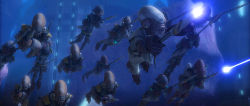 The Marine Corps defends the Compound, and polices its streets.
The Marine Corps defends the Compound, and polices its streets.
Armed typically with E-5 blaster rifles, as well as melee weapons such as survival knives, harpoons, and tridents, the Marine Corps serves as the Compound's police force. In addition to this, they defend the Compound from invading forces, though like any planetary militia on New Tython they are insufficient to handle the invasion of interstellar forces such as Brotherhood Clans - a measure implemented by the Jedi, to ensure New Tython did not become a conqueror world or a planet of ceaseless wars. Typically, Marine Corps servicemen handle crime, incursions by Harakoan tribes outside of the treaty, and defense of the Compound and affiliated settlements from wildlife and other threats. All in all, they do an exceptional job, with the Compound being one of the safest, if strictest and least-democratic, places to live on the planet.
Notably, the Marine Corps is a path toward higher placements in the Compound's administrative body and infrastructure, with good service often leading to either education and apprenticeship in trades and careers or positions of administrative and political power; without such service, the less-influential families of Mon Calamari would be hard-pressed to enter the higher echelons of Compound society, while the Quarren minority virtually never climb the ladder without some help and almost never attain political power; Chairman Viik is a notable exception, and a rarity. While the Corps is a path for any Mon Cal or Quarren citizen to rise, it requires that an individual be entirely amphibious and need no special training or equipment to serve in underwater missions. Thus, while they work together with the KUDF, the Jedi, and other nations for joint missions, no one who is not a Quarren or a Mon Calamari has ever been allowed into the Marine Corps.
Towns and Villages
As an Independent City-State, the Dac Compound technically holds borders and jurisdiction containing several affiliated villages and settlements, established prior to the Treaty of Menat Ombo by spreading Mon Cal colonists. These fall under the governmental authority of the Elder Council, with each settlement run by an Elder chosen by the Council and protected by Marine Corps members. Though notably more diverse than the Compound proper and obviously far less sophisticated, each settlement was generally established with a resource or strategic purpose in mind, and all serve in the meticulous plans of the Council.
Places of Interest
Elder Tower
Tall, ovoid, and proud, the Elder Tower houses many aristocratic and administrative Mon Calamari in their day-to-day activities and is the site of governmental proceedings from the lowest maintenance subcommittees to the Elder Council itself. Full of meeting rooms, offices, lobbies, and even cafes and refreshment centers for government officials, it is an extravagant place, while also functioning as a fortified and capable nerve center for the Compound. Full of fountains, pools, and constructed rivers, the Tower constantly pumps fast-moving water through these passages; while seen as decoration by many, they double as rapid-deployment chutes for Marine Corps members in times of emergency, as well as evacuation routes for threatened Mon Calamari. The Tower sustained damage during the retaking of the Compound from Thuron's forces, but has since been repaired, with a statue of the slain Chairman Bilghal erected in its main lobby to commemorate the Compound's losses.
The Kraken's Claw Cantina
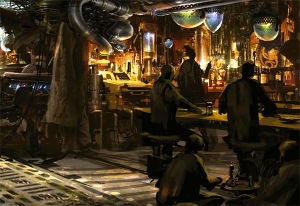 The Kraken's Claw.
The Kraken's Claw.
Established early in the history of the Compound and maintained by a series of owners ranging from shrewd, unconventional businessmen to its current owner, Rajavik - a former pirate by his own admission - the Kraken's Claw Cantina is the primary source of patronage for spacers, visitors, and gambling locals of the Dac Compound. Colorful, full of exotic, off-world extravagances like Bith bands and alien dance troupes, the establishment caters to ladies and gentlemen used to roaming the highways and byways of the Galaxy's trade routes and secret passages. It offers options from holo-gambling to sabacc, as well as organized betting on off-world activities such as podraces, shock boxing, and even combative and beast-fighting events - not all of them legal in every system, or even every nation on New Tython. Through shrewd administrative skills and legal chicanery, the establishment has allowed itself to function by skirting the law and exploiting loopholes, without actually drawing condemnation from the Elder Council; that said, it is steadfastly avoided by the Marine Corps, which has banned its members from becoming patrons.
Prison Compounds
Round, patrolled via balcony, and full of water, the Prison Compounds hold Mon Calamari and Quarren prisoners, as well as the occasional unlucky off-worlder. Controlled by a series of vents and pumps, the spheres of the Compounds can be drained or pumped full of water as needed, the latter technique used to refresh standing water within while the former is used to prevent Mon Calamari prisoners from reaching the balcony to the entrances if the slippery walls are fully drained of water. The balconies allow Marine Corps members to enter and pacify rioting prisoners in the event of full drainage, and to give them a chance to enter and retreat from the cells during exercise periods for convicted felons. Cells built into the Compounds' floors hold prisoners behind force fields, designed not to injure but stinging if attempts are made to penetrate them. These compounds once held the Elder Council and Marine Corps, until they were freed by the Jedi Kah Manet.